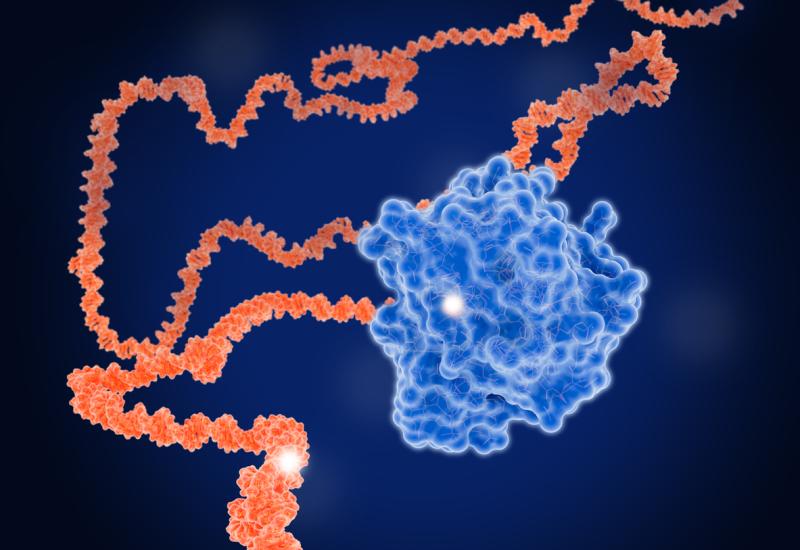
Pfizer moves into the VEGF bispecific fast lane
There will soon be three PD-(L)1 x VEGF projects in pivotal lung and colorectal cancer trials.
There will soon be three PD-(L)1 x VEGF projects in pivotal lung and colorectal cancer trials.

Months after paying 3SBio $1.25bn for a seat at the high altar of PD-(L)1 x VEGF bispecifics, Pfizer is moving the subject of that deal, PF-08634404, into pivotal development.
Two phase 3 studies of the molecule have just been revealed on clinicaltrials.gov, one in first-line lung cancer and the other in front-line colorectal. These show Pfizer broadly mirroring what the most advanced players in this space, Summit/Akeso and BioNTech/Bristol Myers Squibb, have been doing with ivonescimab and pumitamig respectively.
In NSCLC PF-08634404 is being combined with chemo, and pitted against Keytruda plus chemo – precisely the approach being taken with ivonescimab in the Harmoni-3 trial, and with pumitamig in Rosetta Lung-02. While the latter is a phase 2/3 study with safety/dose-finding elements, Pfizer’s appears to be a fully fledged phase 3.
Equally interesting is the US company’s splitting of the new trial by histology, into squamous and non-squamous cohorts. This is also being undertaken in Rosetta Lung-02, while ivonescimab’s Harmoni-3 trial was recently upsized, with its co-primary endpoints split between the squamous and non-squamous histologies.
PD-(L)1 x VEGF trials in first-line NSCLC
| Ivonescimab | Pumitamig | PF-08634404 (SSGJ-707) | |
|---|---|---|---|
| Company | Akeso/ Summit | BioNTech/ Bristol Myers Squibb | Pfizer/ 3SBio |
| Trial | Ph3 Harmoni-3* | Ph2/3 Rosetta Lung-02 | Ph3 C461001 |
| Population | Squam & non-squam | Non-squam (substudy A) & squam (substudy B) | Squam (part 1) & non-squam (part 2) |
| Regimen | + chemo, vs Keytruda + chemo | + chemo, vs Keytruda + chemo | + chemo, vs Keytruda + chemo |
| Primary endpoint(s) | PFS & OS, separately in squam & non-squam | ORR (ph2); PFS & OS (ph3) | PFS & OS |
| Note | Readout due H2 2026 for squam & H1 2027 for non-squam | Started Jan 2025 | To start Dec 2025 |
Notes: includes only ivonescimab global trials; *Summit is also carrying out Harmoni-7 in PD-L1≥50%. Source: OncologyPipeline.
Meanwhile, colorectal cancer is an increasingly popular tumour type for PD-(L)1 x VEGF bispecifics. Akeso was first to take ivonescimab into a Chinese phase 3 trial here, starting the Harmoni-GI6 study in May; this followed a combo with the anti-CD47 MAb ligufalimab and chemo yielding an 88% response rate in front-line disease.
A pivotal colorectal cancer trial of pumitamig, and Summit’s own ivonescimab phase 3 study, are imminent, though the latter hasn’t yet got a clinicaltrials.gov entry. Now PF-08634404 is in the mix too, with its study due to start in December. All three will test a chemo combo against Avastin plus chemo, with similar enrolment criteria, though pumitamig's also has a phase 2 stage.
PD-(L)1 x VEGF trials in first-line colorectal cancer
| Ivonescimab | Pumitamig | PF-08634404 (SSGJ-707) | |
|---|---|---|---|
| Company | Akeso/ Summit | BioNTech/ Bristol Myers Squibb | Pfizer/ 3SBio |
| Trial | Ph3 Harmoni-GI3 | Ph2/3 Rosetta CRC-203 | Ph3 C6461003 |
| Population | Microsatellite stable, no BRAF V600E mutations | Microsatellite stable, no BRAF V600E mutations | Microsatellite stable, no BRAF V600E mutations |
| Regimen | + chemo, vs Avastin + chemo | + chemo, vs Avastin + chemo | + chemo, vs Avastin + chemo |
| Primary endpoint(s) | PFS | ORR (ph2); PFS (ph3) | PFS & OS |
| Note | Not yet listed on ct.gov | To start Mar 2026 | To start Dec 2025 |
Note: includes only ivonescimab global trials. Source: OncologyPipeline.
Pfizer licensed PF-08634404, then coded SSGJ-707, from China’s 3SBio for $1.25bn up front in May, at which point the molecule was in phase 2 development. Early data revealed in an ASCO poster showed impressive activity, but also raised questions about toxicity.
The following month 3SBio started a Chinese phase 3 trial in front-line NSCLC. This is notably different from Pfizer’s planned pivotal study, however, involving a head-to-head comparison of monotherapy versus Keytruda, and enrolling only patients whose tumours express PD-L1.
4516













